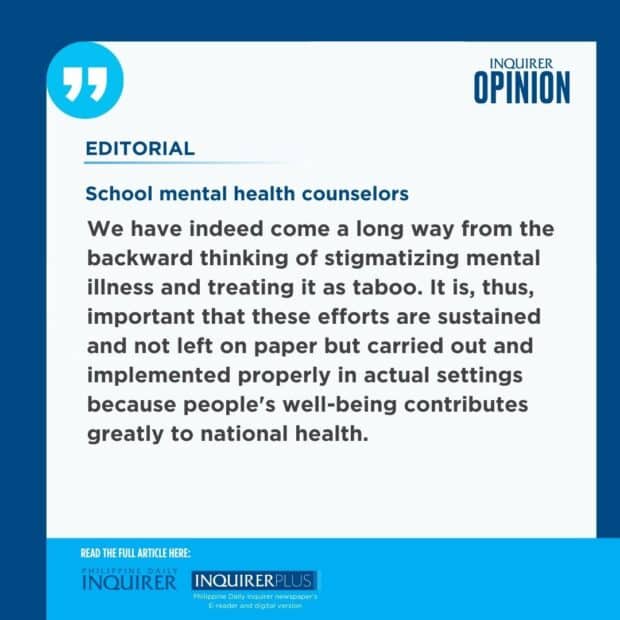School mental health counselors

The government has taken a major step in addressing the mental health crisis, particularly among the youth, with the signing of Republic Act No. 12080 or the Basic Education Mental Health and Well-Being Promotion Act which institutes school-based mental health programs in public and private schools.
RA 12080 seeks to promote mental health awareness, address mental health concerns, and enhance suicide prevention efforts in schools.
In the school year 2021-2022, per the Department of Education (DepEd), 404 learners from public schools committed suicide. This was at the height of the COVID-19 pandemic that impacted students’ mental health. In addition, 2,147 learners attempted suicide, and 775,962 sought guidance counseling, among the 28 million student population.
Article continues after this advertisementAlarming figures
These alarming figures have prompted calls for immediate intervention in schools by not only instituting mental health programs but also employing mental health experts, instead of letting school personnel with no appropriate training handle mental health cases.
The highlight of the new law, which will further strengthen RA 11036 or the Mental Health Act, is the creation of new plantilla positions for school counselors, counselor associates, and schools division counselors, and reclassifying existing job items. This means permanent government positions for mental health personnel will be backed by an annual budget allotment, making them an essential part of public service.
In addition to these new positions, the DepEd is also tasked with establishing care centers in all public schools and ensuring their existence and maintenance in private schools. These centers will serve as hubs for mental health services that offer tailored support systems to learners.
Article continues after this advertisementThe law also requires schools divisions to create a mental health and well-being office to provide the framework for school-based mental health programs, review and approve their implementation, and conduct regular visits to ensure effectiveness. These offices will also be responsible for training mental health personnel.
School-based mental health
As Inquirer columnist and psychologist Anna Cristina Tuazon said, the creation of new plantilla positions is rare in public service. On one hand, it acknowledges that mental health is an essential part of learners’ well-being. On the other hand, it also recognizes the importance of having personnel with adequate guidance and counseling training present in schools.
As Tuazon wrote in her Dec. 12 column in this paper: “The misconception about school-based mental health is that cases in this setting are somehow milder or less severe than clinical settings. Our experience, however, is that we see the widest range of cases in schools—from identity issues and relationship concerns, to more severe issues like abuse and suicide. The alarming rate of suicide risk in schools, even among young children, should have pointed us to the need for highly skilled mental health staff.”
But, as Tuazon also pointed out, there are challenges ahead, including the requirement for school counselor associates to have a bachelor’s degree in guidance and counseling, psychology, and other related fields. She noted that very few universities offer a bachelor’s degree in guidance and counseling since this is usually offered at the graduate level, and most undergraduate curricula in psychology and other social sciences are not designed to train students in providing mental health services because the disciplines are scholarly by nature.
While this law seeks to address the severe shortage of mental health professionals in schools, DepEd must also see to it that there are enough degree programs and that these disciplines meet the law’s requirements. If unaddressed, this can result in a shortage of qualified personnel or, worse, filling up the positions with those who do not have the required skills just to be compliant with the law.
Notable step
And while the newly signed law assures a budget allocation yearly, there is no guarantee that it will not fall victim to realignments or budget cuts as is often the case. As it is, next year’s national budget has already seen several cuts in essential areas such as health and education. DepEd must see to it that these positions are provided for and advocates must closely monitor implementation to ensure that the government is putting its money where its mouth is. Otherwise, this will end up as just another well-intentioned law that fails in implementation.
Nonetheless, RA 12080 is a notable step and shows how the country has progressed in putting mental health on the national agenda. We have indeed come a long way from the backward thinking of stigmatizing mental illness and treating it as taboo. It is, thus, important that these efforts are sustained and not left on paper but carried out and implemented properly in actual settings because people’s well-being contributes greatly to national health.
















